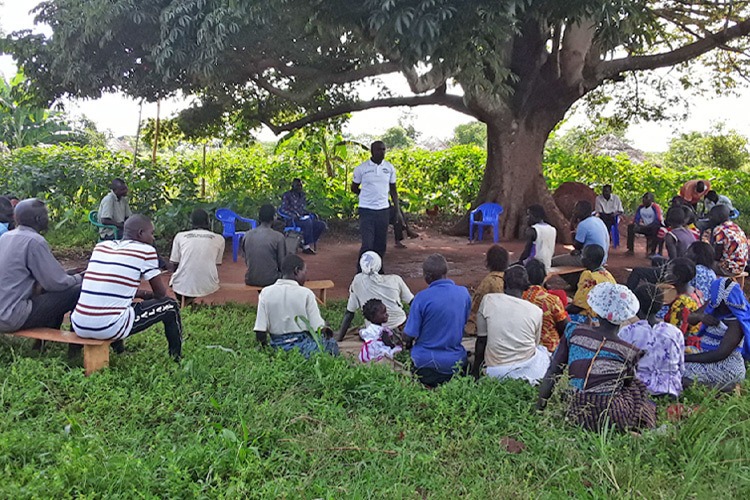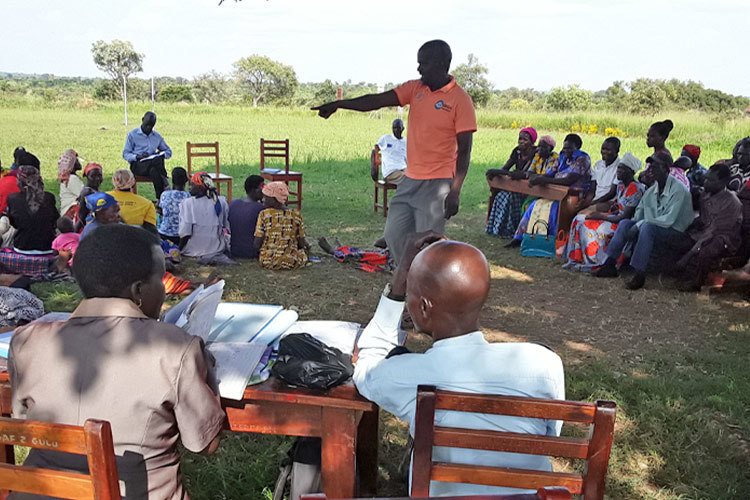In the shade of a mango tree in northern Uganda in 2004, Pamela Angwech started Gulu Women’s Economic Development and Globalization (GWED-G). From its humble beginning, her organization has grown into the largest grassroots human rights group in the region despite immense challenges. The region is still reeling from the Lord Resistance Army (LRA) war, which tore through Uganda from 1987 to 2006, destroying families and livelihoods. And deeply patriarchal values lead to limited educational and economic opportunities for women and girls.
But GWED-G is working to change all that. And they’re inviting some key allies to the fight.

Pamela and her team believe that to achieve gender equality, men must also be agents of change. That’s why GWED-G launched their Role Model Men program. Role Model Men mobilizes the community’s men to break strict patriarchal norms; to go from upholding the status quo to becoming essential partners and leaders in the prevention of gender-based violence. The project is designed to reduce gender-based violence in local households and create healthier relationships within families, especially between fathers and their children.
Towards the end of the LRA war, Pamela was working with the United Nations, helping people in Internally Displaced Persons (IDP) camps access food through the World Food Program (WFP). She saw that the war especially impacted women, leaving them in abject poverty and vulnerable to sexual and bodily violence.
“[The women] were suffocated,” Pamela says. “They were abandoned, moving with their head down. They were paying the price of the LRA conflict in the region.” Pamela realized that food was not enough, and left WFP to begin mobilizing women directly. But she knew engaging just women wasn’t enough either; both men and women needed to buy in for society to move towards gender equality.
“In the different households that each Role Model Man visits, we want the father to have conversations with his family and his daughter,” Pamela adds. “We want her to continue going to school. She’s not a wife at this moment. She needs to study. She needs to be an empowered woman in the future. She can contribute to the development of our village, our community. She needs to be supported and she needs protection.”
Changing what’s expected from a man, and what’s possible for a woman
Geoffrey Oyat Shimita is the coordinator for gender-based violence prevention at GWED-G, where he is responsible for helping shift men’s attitudes about masculinity and violence across the Gulu region. He monitors, mentors and trains local men to become Role Model volunteers in their communities.
“Being a role model man means you support your family by paying school fees for both boys and girls. You support your wife, you do housework, and you work together as a couple,” says Geoffrey. As a Role Model, Geoffrey explains, “[Other men] see what you do, how you relate in the community, and see that they can do this too. They say ‘okay, this is possible.'”
After being trained by GWED-G, each Role Model regularly visits 10 homes in his community to encourage dialogue around gender roles and expectations, with the goals of eliminating child marriage, supporting girls’ education and opportunities and increasing men’s involvement in caregiving, family planning and domestic work. Role Models also run workshops and household dialogues in their communities about issues such as teen pregnancy and gender-based violence.
What’s more, they act as catalysts to young women becoming independent, introducing them to GWED-G’s economic empowerment programs that run concurrently with the Role Moden Men program. These include a local baking academy and the ‘Piggery Project,’ in which young women are given piglets to raise, breed and sell.
With this additional income, some girls have furthered their studies and entered into hotel management and agricultural jobs. Others have become chefs or bakers. GWED-G has connected girls to job opportunities in restaurants and hotels in Kampala, the capital city.

Pamela explains that many girls are “passing on their piglets to other young people who are in a similar situation. That is amplifying the outcomes. At least 15 girls who were not direct beneficiaries of our program have received piglets, and they will pass them onto others.”
Building Lasting Change in Northern Uganda
While GWED-G empowers Role Model Men to change their local communities, and empowers girls to earn their own income, the organization is also enacting change on a much wider scale as well. Through GWED-G, Pamela has built a network of 650 grassroots women’s solidarity groups, working with 800 community leaders, 1,000 human rights volunteers, community activists, referral actors, land-based defenders, and human rights defenders, at both the local and global level.
GWED-G has made a remarkable impact on communities in northern Uganda, shifting gender roles that’ve been static for generations. Geoffrey says that now it is common to see men washing their own clothing, cooking food for their family, accompanying their wives and children to medical appointments, and being involved in family planning. Additionally, girls are more likely to be in school, and there is overall less physical violence.
Pamela shares, “For us, our success is based on empowering women and girls to have the agency to use their voices in the community, so that they can protect themselves, make demands, and take action to further their own lives. And we’re creating a supportive environment that helps men practice positive masculinity, to have healthy, equitable relations both at home and in their community.”
